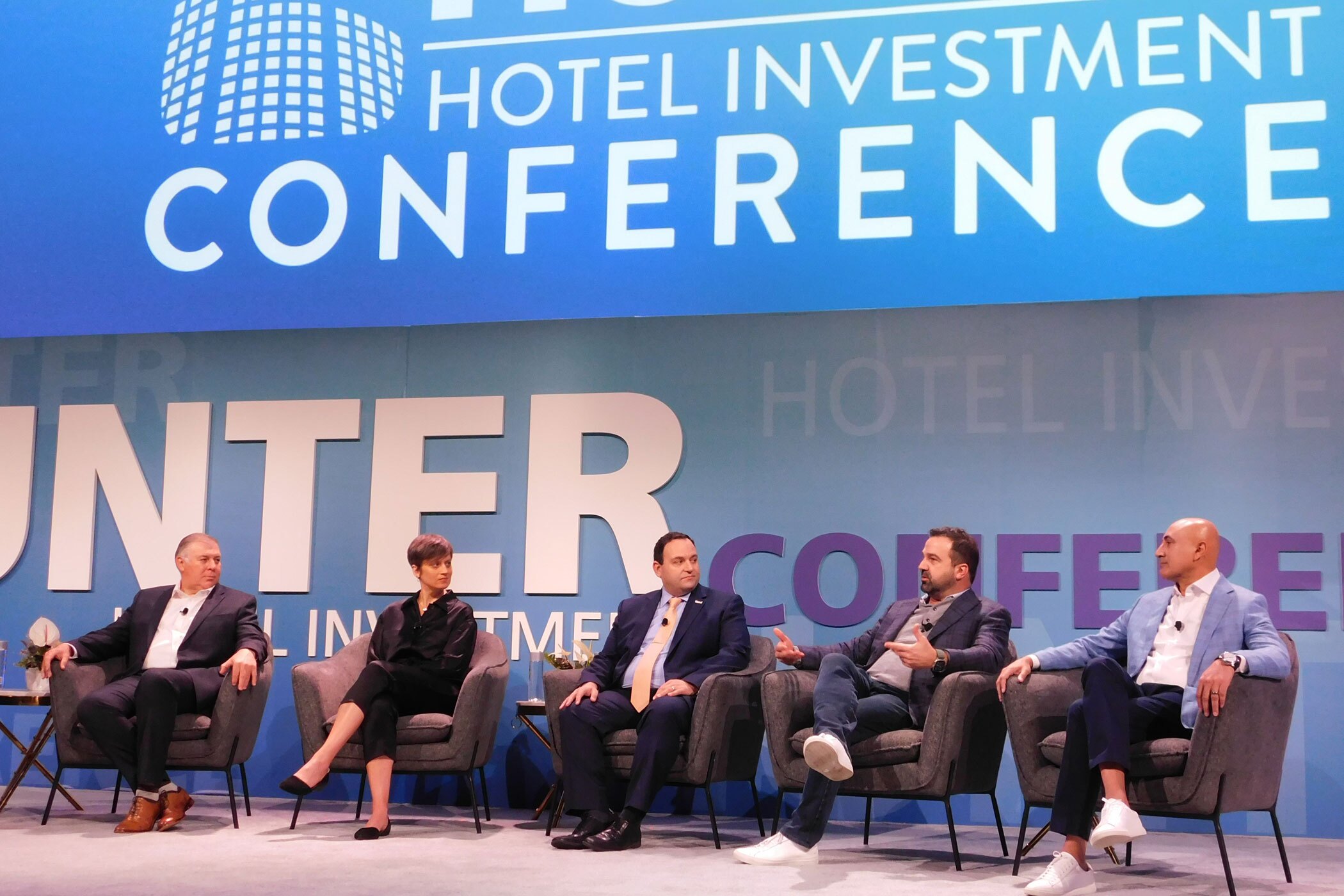ATLANTA — Leadership styles vary among organizations, but most leaders agree that every employee within a company brings their own set of skills to a team, and allowing people to be who they are is what creates a successful outcome.
Speakers on a panel titled “Perspectives on Leadership” at the 2023 Hunter Hotel Investment Conference said there are certain traits that draw a line between successful leaders and poor ones.
Danny Hughes, president of the Americas for Hilton, said being in the moment and dedicating time to associates is what makes a difference in company culture.
A trait he feels should not be present in a leader is complacency.

“When things are going good and it’s OK in my world … there’s [still] some challenges out there and you’ve got to be aware of them,” he added.
Julienne Smith, chief development officer of the Americas for IHG Hotels & Resorts, said something that helped her when she entered the industry 20 years ago was having mentors who brought her into conversations.
“[They] would say, ‘Just listen to how this negotiation goes or come to this meeting, meet some of the executive team [and] let them get to know you,’” she said.
That is now something that Smith does for young, up-and-coming talent in the industry. Despite a hectic schedule, Smith said she makes time to interact with anyone who reaches out to her for advice.
“When someone reaches out and says, ‘I’d love to hear your story, do you have time?’ I always find that time. It might be next month, it might be only 15 minutes, but saying yes to having those conversations and sharing your story is important,” she added.
The type of leader Smith doesn’t want to be is someone who commands and controls employees “to go from A to Z in this specific way.”
“It doesn’t work. I think it stifles creativity and each person brings their own merit, their own skills to the table. I don’t want everybody to be like me; that’s not going to work. I need a variety … so allowing people to be who they are just makes the team stronger.”
Compassion is what Red Roof President George Limbert said is the best leadership trait he’s seen in others, and it’s something he tries to emulate. When life gets in the way, having compassion for each life moment is “one of the most important things we all can do as leaders,” he said.
In contrast, failing to listen to all stakeholders is where leadership can crumble. Maybe it’s not the highest-ranking employee with the idea, Limbert said, but that doesn’t mean they don’t have noteworthy suggestions.
The types of leaders Jim Merkel, CEO and co-founder of Rockbridge Capital, said he looks up to are ones who believe in forgiveness, can be the calmest one in the room when the intensity is at the highest, and can address people with deference even when it feels like deference isn’t due.
Mitch Patel, president and CEO of Vision Hospitality Group, said a person’s leadership style is ultimately determined by one’s experiences.
At Patel’s first job after college, which wasn’t in the hospitality industry, his boss on the first day handed him a binder and said “go to it.”
“He never got to know me, who I was, what I liked, what my hobbies were, my family. It was more of just, what can I do for them, as opposed to really getting to know me as a human being,” he said. “When I started [Vision Hospitality Group], I vowed that I would never be that type of leader; I would never have that type of culture in our organization.”
Patel said the most successful companies in the world are the ones with incredible workplace culture where people come first.
“In my opinion, there’s two ways to lead. You can lead with fear; how sustainable is that going to be? You can be the most strategic person in the world, the smartest person in the world, but leading by fear, you’re going to be leading by yourself,” he said. “Or, you can lead with true, deep admiration and mutual respect. So we look for people that share our values and beliefs. If they don’t share our values and beliefs, then they can’t be a part of our team.”
Something a leader needs to be clear about is who they are and the type of culture they have, Merkel said.
His goal when starting Rockbridge was to work with people who would challenge him but also become friends “both on and off the court,” he added.
“We build a culture where lifelong friends are created. People that have left are still super close friends and have gone on and done great things; that’s really rewarding,” Merkel said.
Building Relationships
Hughes said the formula fpr having successful business relationships is finding a common ground with one another. One of the best pieces of advice he’s ever been given is, “if you want friends, be a friend.”
“No matter whether you’re trying to drive diversity, sustainability or having these great relationships, there’s a company-professed vision, that actually to make it live and breathe, everyone of us has to make a difference,” Hughes said.
Limbert said relationships are the key to franchising as well as connecting with the communities in which a company’s hotels are located.
“We really treat our franchisees like true partners. We’re all working towards that common goal. What COVID taught us is that having a relationship with your community as a hotelier is exceptionally important,” he said. “I think we always felt like we were part of our communities in which [our] hotels are located, but more so that amplified when we were housing first-responders during COVID, housing nurses and doctors; now that relationship with a community is so much more important, not only to be good corporate citizens but also to help with all of the issues we face as an industry.”


